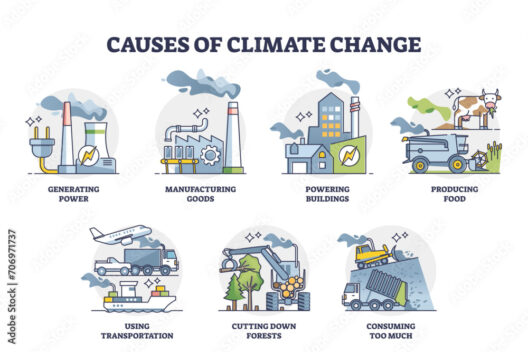In today’s rapidly changing climate, families around the globe are increasingly aware of the profound impact their energy consumption has on the environment. In the face of climate change, conserving energy becomes not just a personal choice, but a moral imperative. Each household can contribute to a collective solution, nurturing a sustainable ecosystem for future generations. Here are some smart tips that families can incorporate into their daily routines to conserve energy together.
Understanding Energy Consumption
Energy consumption is often an invisible aspect of daily life; however, the consequences are tangible. Observations of unusually high energy bills can prompt families to analyze their habits closely. By understanding where their energy is being used—be it heating, lighting, or powering appliances—families can identify opportunities for conservation. A simple energy audit can reveal which appliances consume the most power and which behaviors contribute to excess usage.
Embrace the Power of Togetherness
Families can foster a collaborative spirit when it comes to energy conservation. Setting collective goals promotes a shared sense of responsibility. Consider initiating a family meeting to discuss energy usage and brainstorm solutions together. This collaborative approach not only strengthens familial bonds but also instills eco-conscious values in children, shaping them into responsible adults.
Simple Habits for Daily Energy Savings
Start with small, manageable habits that don’t disrupt daily life. For instance, encouraging family members to turn off lights when leaving a room can significantly reduce energy wastage. Unplugging devices that aren’t in use or employing power strips with switches can eliminate phantom loads that add to energy bills. These simple, collective actions can be surprisingly impactful over time.
Optimize Heating and Cooling
Heating and cooling account for a substantial portion of a family’s energy costs. Families can collectively engage in maintaining optimum thermostat settings. In winter, set the thermostat to a cooler temperature and bundle up with blankets and warm clothes; in summer, raise the temperature and utilize fans to circulate air. Additionally, ensuring that windows are properly sealed and using thermal curtains can minimize heat loss in winter and heat gain in summer, enhancing comfort while reducing energy consumption.
Limit Water Heating Usage
Water heating is another significant energy expense. Families can work together to reduce hot water usage by taking shorter showers and fixing any leaks promptly. Using cold water for washing clothes and only running the dishwasher with full loads can contribute to significant energy savings. These practices not only conserve energy but also instill water conservation values within the family dynamic.
Energy-Efficient Appliances
Investing in energy-efficient appliances can yield long-term savings. While the initial cost may be higher, the energy savings over time can be substantial. Families should look for appliances with the ENERGY STAR label, which signifies compliance with energy efficiency guidelines. Discussing these investments as a family can help everyone understand the long-term benefits for both the environment and household finances.
Leverage Natural Resources
Harnessing natural resources can significantly reduce energy needs. Families can maximize the use of daylight by opening curtains and blinds during the day, which reduces reliance on artificial lighting. Engaging in outdoor activities during daylight hours not only conserves energy but also promotes physical well-being. Additionally, whenever feasible, consider outdoor cooking methods, such as grilling, which save energy and can be a fun family activity.
Educating for Sustainability
Children are often more receptive to environmental messages than adults might assume. Engaging them in discussions about climate change and energy conservation can ignite their passion for sustainability. Educational resources, such as documentaries, books, and local workshops, can further instill the importance of these issues. Making learning about environmental stewardship a family affair can lead to lasting changes in attitude toward energy consumption.
Engaging in Community Initiatives
Community involvement amplifies family efforts in energy conservation. Many municipalities offer programs and incentives aimed at reducing energy use. Participating in local clean-up days, tree planting, or community solar initiatives not only fosters a sense of community but also reinforces the family’s commitment to sustainability. By joining forces with neighbors, families can create a more significant impact, demonstrating the power of collective action.
Tracking Progress
Establishing benchmarks and tracking progress can maintain motivation within the household. Families can create a visual chart to document energy savings. Monthly discussions about energy consumption can foster accountability, ensuring that everyone remains engaged in the shared goal of conservation. Celebrating milestones, whether big or small, helps to maintain morale and emphasizes the positive effects of collective efforts.
Reflection and Adaptation
The journey toward energy conservation is ongoing and requires reflection and adaptation. Families should periodically reassess their energy habits and seek new strategies to improve efficiency. Engaging in open discussions about what is working and what’s not can help families stay committed. They can also adapt their strategies to suit changes in lifestyle or household dynamics.
As climate change continues to challenge the way we live, families must recognize their role in mitigating its effects. Conserving energy together not only reduces individual household expenses but also nurtures a more sustainable future for the planet. By incorporating smart tips into daily routines, families can catalyze change within their households and beyond—creating a ripple effect of compassion for the environment that will endure for generations to come.







